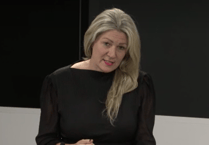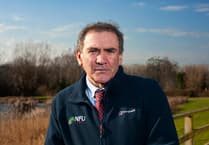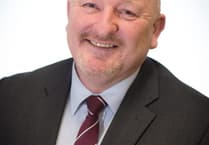The River Usk has been consistently making headlines this year, following the news that it can no longer supply the Mon and Brec. But now there are renewed calls to clean up the river and take those responsible to task.
This week, a local fisherman recorded an alarming phosphate reading of 12.4mg per litre in the river at Abergavenny.
However, Welsh Water told the Chronicle that its monitoring revealed a different result, much closer to a healthier range.
“There have been no sewerage spills at our site in Abergavenny this week,” a spokesperson said.
“We continually test and monitor our wastewater treatments works, and the site in Llanfoist is operating well within the permitted limit of 5mg/l of phosphorous in the water it returns to the river.”
“Work is currently ongoing on the site to enable chemical dosing to help strip phosphorous, which will be operational in time for its new permitted maximum of 2mg/l in December 2025.”
“We are working to resolve some increased turbidity on site, which is making the treated water appear cloudy, but key markers such as phosphorous, ammonia and solids are all within limits set by our regulators.”
However, Save the River Usk still claims the effluent being discharged at Abergavenny is not treated.
Data is collected by the group all year round, and it says that if its data is to be believed, there should be serious investigations into whether discharge is within regulations.
“The situation is not getting any better, with our data suggesting Welsh Water is pumping out above the legal limit at all of its treatment plant pumps,” said Save the River Usk founder, Angela Jones.
“It is as if Natural Resources Wales are in bed with the country’s biggest polluters, they just won’t take on the big cats.”
NRW announced plans to reduce its response rate to incidents of pollution and instead accept a “higher tolerance of risk” this week. It has made the decision due to what it describes as “years of underfunding.”
Not only is the high phosphate reading indicative of dangerous pollution levels, but Save the Usk says funding is not an excuse for its ignorance of the data it provides.
“We have data and scientist teams, who have offered to provide data to NRW to aid them in reducing pollution in the river,” Angela told the Chronicle.
A spokesperson for NRW recognised the need for improvements, but said “citizen data” should not be relied on alone.
“The challenges facing our rivers are complex, and while we are taking urgent action to improve water quality, it will take time to see the real-time improvements we all want to see,” they said.
“However, much of NRW’s statutory monitoring requires water samples to be taken following accredited methods and processes and analysed to standard methods in accredited laboratories.”
“There are also many factors that need to be taken into consideration, including making sure they are taken from the central flow of the water course and not close to any permitted discharges.”




Comments
This article has no comments yet. Be the first to leave a comment.